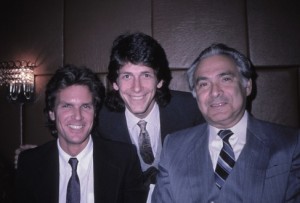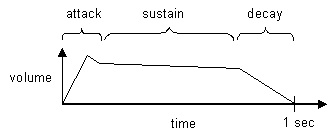Scott Hartman is a trombonists trombonist, and musical to the core. In the debate between valves and slide that is often the brass quintet, Hartman has proven to be one of the slide’s most articulate and eloquent spokesmen. An impressive soloist in his own right, Hartman served for nine years as the trombone counterweight to the stratospheric solos of trumpeter Rolf Smedvig in the Empire Brass. He is in a unique position to address “FIVE!”, and does so….
1. You are one of the masters of matching trumpet AND horn articulation. How do you change your approach to the front side of the note to match trumpets? Horn?
I think about articulation – and most technical – in mechanical/acoustic terms. So an articulation is the dynamic shape which begins a note and I picture it in my mind like this example:
Each instrument/player has a palette of articulations that they use and the more they have available, the more variety and nuance you bring to the music. Once I identify the sound I want I use the mechanical processes that bear on articulation, i.e., air, tongue, slide, using the partials/overtones in transition to achieve the result. If it sounds right – it is right!
2. You can play really clean, or let it rip! How do you think of “hiding the slide”-(or its smears) when matching trumpets as opposed to your vibrant yet very rhythmic approach to glisses, scoops and falls?
Related to the previous comment on articulation, I have to imagine a sound first, then figure out how you make this sound on the trombone. Oftentimes, I find that people don’t feel that it is correct or appropriate to do something – mechanically or musically – so they restrict their musical palette in the process. I leave the door open to try to make any sound that comes to mind and use any technique that achieves it.
Technique is whatever I do in the process of making a sound. Again, if it sounds right – it is right!
So, a more succinct answer to your question. I think about the air, embouchure, tongue, slide, overtones, valve and how they interact as I make a sound.
3. What are your fondest memories of Rolf?
There are so many Rolf stories! My favorites are the ones that capture his uniqueness as a person. Here are several!
A. We toured the Soviet Union in 1987 as Glasnost was implemented as a policy to open up and soften the Cold War. While in Leningrad (now returned to its previous name of St Petersburg) we toured some of the amazing buildings and institutions left behind by Peter the Great. We saw l’Hermitage, the palaces and his chapel. After several hours of sight seeing these marvels, Rolf showed his true colors by asking the tour guide “How do you get to BE Czar?†Rolf thought big!
B. We did a lot of skiing together on many tours and finished each day with a concert. Rolf was an excellent skier and loved being outdoors. We shared some fun times this way.
C. My good friend, Don Robinson, came out to serve as our Road Manager/Driver for a couple of
tours. Rolf liked to sit in the back of the van and was always quick to offer criticism of peoples driving. Don made a couple of abrupt turns and stops the first day out and Rolf made the comment that Don drove like the bass trombone player that he is…whatever that means… “Phrase it, Don!†was a common call from the rear of the van. So Don tried ‘Phrasing’ his stops by taking ¼ mile to come to a stop at a light – Rolf didn’t like that, “Use your brakes, Don!†– so the next time, Don pumped the brakes ABS style. Rolf almost lurched out of his seat this time and launched into Don, who replied that he’s just following instructions! That was it, Rolf gave up. That was the quickest and most obvious concession I ever saw Rolf give!D. Also in the Soviet Union, we had several Soviet handlers and a lot of contact with the US Embassy  since this was one of the first cultural trip to the Soviet Union under glasnost. Rolf started dating a Soviet woman that he met at the hotel which was espressly forbidden by the Embassy. The Ambassador became concerned and gave Rolf and the group a lecture about our being cultural and national representatives and that the Soviets may try to use us to create a scandal of some sort. Therefore, no socializing with unauthorized women, no dealing with contraband of any sort. We were all asked if we’d had anyone approach us offering us contraband…Rolf was adamant that he’d certainly not! Afterwards, on the bus, Rolf asks… ‘What’s contraband?’
since this was one of the first cultural trip to the Soviet Union under glasnost. Rolf started dating a Soviet woman that he met at the hotel which was espressly forbidden by the Embassy. The Ambassador became concerned and gave Rolf and the group a lecture about our being cultural and national representatives and that the Soviets may try to use us to create a scandal of some sort. Therefore, no socializing with unauthorized women, no dealing with contraband of any sort. We were all asked if we’d had anyone approach us offering us contraband…Rolf was adamant that he’d certainly not! Afterwards, on the bus, Rolf asks… ‘What’s contraband?’
E. ON and on…
4. How did your approach to music change as a result of your time in EB?
I learned how to listen much better and to be more aware of everything. I remember realizing that I need to have an opinion of rhythm/tempo/momentum at all times. Playing with others, this is necessary. I didn’t understand that before my time with the EBQ! We also taught chamber music at Tanglewood and Boston University, as well as numerous masterclasses. I learned from listening to the others teach/talk and also by having to formulate answers to questions that would achieve the proper result.
 5. Were there moments in EB when you fully absorbed the music making at its best and thought to yourself, “this is as good as it gets!”?
5. Were there moments in EB when you fully absorbed the music making at its best and thought to yourself, “this is as good as it gets!”?
During excellent concerts and hearing recordings, we’d hit a home run sometimes and congratulation ourselves. And after concerts, the audience made us feel appreciated, of course! Now, watching and hearing recordings of live performances reinforces what a great group the EBQ was!
6. What were the best and worst parts of life on the road with EB?
Everything-except rehearsal (and sometimes recording), was great! (Rehearsals could get rather tense.)
7. What selections do you feel are among the best literature for brass quintet?
That’s tough. There is a lot of great rep now. Lots of good transcriptions, of course, but there is so much original rep that is excellent.
8. What do you think of the trend towards smaller tubas (namely F tuba) in brass quintets as opposed to the ‘C’ or ‘Bb’ Tuba?
I have to admit that I always enjoyed playing quintet with a tubist playing a large horn. I miss the solid low notes on an Eb or F.
But, that being said, a lot of rep works better on the smaller instrument.
So, ideally, the tubist will have both horns. Not likely though, on tour…
https://www.youtube.com/watch?v=5P5ndYFZri0
9. What are your favorite EB recorded tracks and why?
My favorite aspect of the EB is the level of chamber music that we enjoyed. When we knew the music, we could reinvent it on each performance; explore musical possibilities on the fly and let the music come to life each time we played. We would transcend our own voice and truly make music. This was amazing to be joined together through music this way, probably much like the bond that is created within a sports team or military unit…
I believe that our first Class Brass recording captured this ability – primarily because the acoustics at the recording were great and you can hear us using the hall the way we would in concert – most other recordings didn’t quite capture the hall acoustics.
c. 2015 David William Brubeck All Rights Reserved. davidbrubeck.com
Interested in more “FIVE” tm interviews?
Canadian Brass 2014, Windsync 2014, Boston Brass 2015, Mnozil Brass 2015, Spanish Brass 2014, Dallas Brass 2014, Seraph 2014, Atlantic Brass Quintet 2015, Mirari Brass 2015, Axiom Brass 2015, Scott Hartmann of the Empire Brass 2015, Jeffrey Curnow of the Empire Brass 2015, Ron Barron and Ken Amis of the Empire Brass, Meridian Arts Ensemble 2015, Berlin Philharmonic Woodwind Quintet 2015, American Brass Quintet 2015





